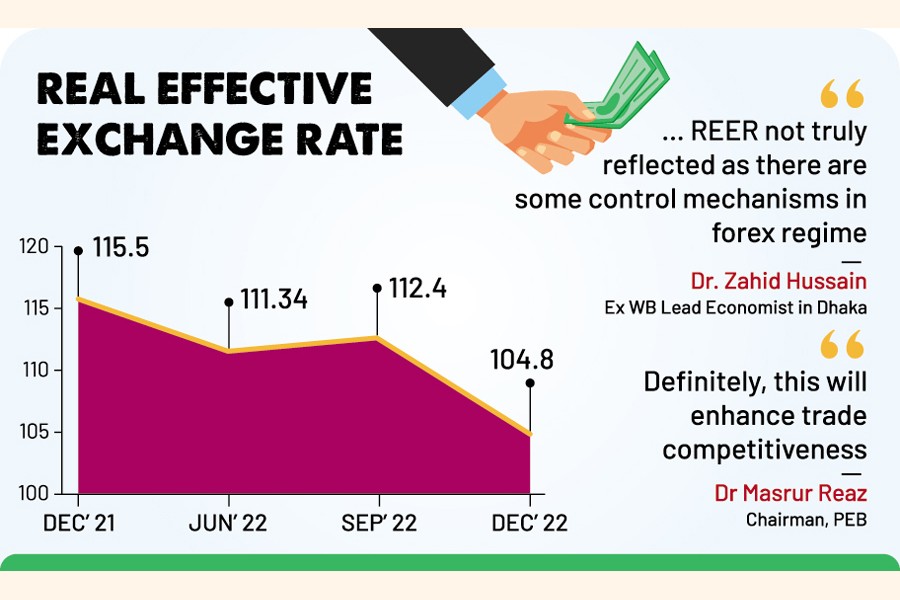Taka's real effective exchange rate nears its fair value
Current REER comparative of 15-currency basket in global trading

Published :
Updated :

Bangladesh's taka now appears to be settling near its fair value after its real effective exchange rate (REER) against a 15-currency basket of global trading partners dropped significantly.
The REER, measured by the central bank of Bangladesh against the currency basket, now stood at 104.8, as of December, according to official count. This high-due to higher deprecations of the BDT in recent past-has not been seen in many years before.
The fair value is 100 in comparative assessment with the currencies in the basket.
Steep inflation persisting in Bangladesh's trading-partner nations is another reason as the price surges over there in the partner economies usually remain much lower than in Bangladesh.
Among Bangladesh's top trading partners are mainly China, the EU, and India. The REER considers the currencies and inflation readings of the top 15 trading partners.
Such valued BDT in terms of the REER will help enhance the competitiveness of Bangladeshi-made goods on the international market, bankers and economists believe.
Central bankers told the FE that such value of the BDT is due to sharp depreciation of the local currency against the US dollar, arguing that "now none can say the BDT remained overvalued".
"When we talk about export-competitiveness, many economists used to say the overvalued local money impacts the international trade," said one of the bankers, who was involved with the process of preparing the index.
The fair value is 100 in comparative assessment with the currencies in the basket.
The REER as an index was recorded at 112.4 in September 2022, 111.34 in June 2022, and 115.5 in December in 2021, according to the latest Bangladesh Bank report.
This gauge can be used to assess the equilibrium value of a currency. An increase in a nation's REER is an indication that its exports are getting more expensive and its imports cheaper. The end result: its trade-competitiveness is on the way down. It is an indicator of the international competitiveness of a nation in comparison with its trade partners.
Economists say this effective-exchange position will enhance the country's competitiveness in external trade.
"Definitely, this will enhance the competitiveness," says Dr M. Masrur Reaz, chairman of local think-tank Policy Exchange of Bangladesh.
He notes that the country's export receipt has been on the rise and it will accelerate further if the REER becomes supportive.
He also says the current drop in the REER is a reflection of the nominal exchange rate.
The nominal exchange rate depreciated by nearly 13 per cent in nine months between June 2022 and February 2023.
Dr Zahid Hussain, former lead economist of the World Bank, told the FE: "To my mind, the REER picture is not truly reflected as there are some control mechanisms in the country's forex regime."
He also mentioned that the inflation measurement raises many questions as to whether or not it is truly calculated.
"If we don't have representative CPI and a controlled forex market, how the REER will be truly assessed? Dr Hussain questioned.
jasimharoon@yahoo.com


 For all latest news, follow The Financial Express Google News channel.
For all latest news, follow The Financial Express Google News channel.